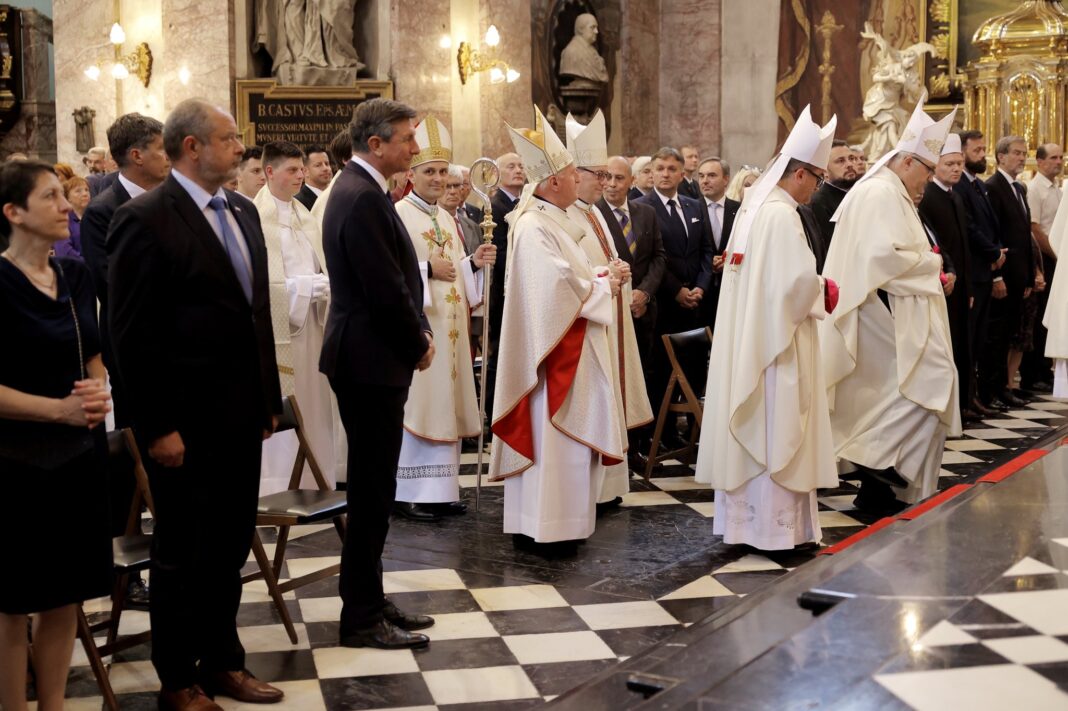By C. R.
In his sermon during the Mass for the Homeland, the Archbishop of Ljubljana, Metropolitan Stanislav Zore, thanked all those who three decades ago were “faithful enough to themselves and their beliefs” who perceived the created opportunity and carried out independence. According to him, part of the credit also goes to the Church, for which he wants the State to continue the dialogue with.
In a sermon at the Mass in the Ljubljana Cathedral, which was led by the President of the Slovenian Bishops’ Conference and the Bishop of Novo mesto Andrej Saje at the concelebration of Slovenian bishops and priests, Zore emphasised the need to thank the people “who were faithful enough to themselves and their beliefs” that they perceived the opportunity created in space and time, and at the same time they had a clear vision and a big enough heart to guide them in carrying out the mission entrusted to them by the people in the plebiscite”. Even though they carried their heads in a bag, that they met opponents of independence and that Slovenia was militarily attacked, these people, in Zore’s words, “did not stop dreaming, did not clone and did not run away, for which Slovenia is grateful”. He especially thanked the independence government led by Lojze Peterle.
In addition to the acts of independence, according to the archbishop, it was also very important that Slovenia was internationally recognised, for which he also attributes the credit to the then Pope John Paul II. “He was personally interested in what was happening in Slovenia and he personally advocated the recognition of Slovenian independence. Thus, one of the most important recognitions came on January 13th, 1992, when the Holy See recognised us as a State, which had a strong impact on all further recognitions and the integration of the young state of Slovenia into the international community,” he said.
He reminded that one of the steps towards the traditionally good relations between the Holy See and Slovenia was the agreement on the regulation of legal issues between the Church and the State, but also regretted that so far there was no “concrete readiness to address all other open issues, which were not the subject of an agreement”: “There was never a suitable time, or the situation was not favourable. Let’s hope that the government that has taken over the leadership of the State of Slovenia will find readiness to address open issues.”
The archbishop wishes the new government wisdom in running the country “and especially in protecting human life, marital and family life, social solidarity with the poor, the sick and the elderly, and in ensuring religious freedom.”
In the end, he revealed his wishes for the further development of the country. Among other things, he wants Slovenia to become a State “in which the fundamental value will be true justice and equality before the law, in which individuals, regardless of position, will not take justice into their own hands and make arbitrary decisions.”
He wants it to “become a country that will ensure the growth and development of children in the safe care of mother and father, which is their most basic right, which no ideology and no country should take away from them”. His dream is also for Slovenia to become a country where there will be no lists of not wanted, but there will be open opportunities for all to create and personal growth.
The President of the Republic Borut Pahor, the President of the National Council Alojz Kovšca, the Ombudsman Peter Svetina, the General State Prosecutor Drago Šketa, current and former ministers, and Members of Parliament and other representatives of political and social life also attended the Mass for the Homeland, with which the Church marked the forthcoming 31st anniversary of the proclamation of independence.

